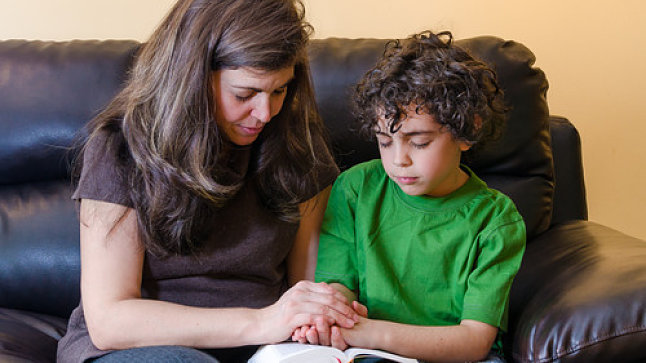Tips for Leading a Child to Christ

Talking to a child about becoming a Christian brings fear to the hearts of many. Will they understand what we’re talking about? If they make a decision, how will I know if it’s real? What if I say something wrong? While these concerns are valid, we need to trust the work of the Holy Spirit and remember we do not save anyone, He does.
Another thing to remember is there is only one way to heaven. There is not one way for adults, another for youth and another for children. The Bible tells us that Jesus is the only way to heaven and anyone who believes in Him will have eternal life (see John 14:6 and John 3:16).
In sharing Christ with children, there are a few simple tips to remember.
o Share with children individually. Talking with a child one to one gives you insight to what they are thinking and feeling. Often times with a group, children will answer for each other. Talking with one child at a time shows each child that the decision they are making is personal and important enough for individual attention.
o Use open-ended questions. These are questions requiring more than a yes or no answer. Children want to please and by asking a question only needing a yes or no, they will give the answer they believe will please those asking the question. Use questions that have the child put what they believe into words. Here are some examples:
- Who is Jesus?
- What is sin?
- Why is sin a big deal?
- What makes someone a Christian?
- Why do you want to become a Christian?
o Encourage a child to express his own ideas and allow time for thinking and responding. It is not unusual for a child to take up to a minute or even longer to answer a question they have not had to think about previously. Give the child time to respond and avoid answering for him. If some time has passed and you sense the child is struggling to put his thoughts into words, reword your question and see if that helps.
o Avoid using symbolism or church talk. For those raised in church being conscious of word choice is important. What does a child think when we talk about being lost? For many an instant of being separated from mom or dad comes to mind. What about saved? Thoughts of being rescued from a swimming pool may pop into his head. If you are not sure if a child understands a word you are using, define the word as you are talking or ask him if he can tell you what it means.
o Avoid giving more information than a child asks for or needs. A lot of spiritual conversations, especially between parents and children, come from questions asked by children. These questions often arise after they witness something spiritual (such as baptism or the Lord’s Supper) or after a tragic event (an accident or loss of a pet). When a child asks a question, answer the question simply. See if the child has any more questions based on your answer and let the child guide the conversation. It is easy to get excited when a child asks a spiritual question and want to tell them everything about becoming a Christian at once. If the child gets bombarded with information that is beyond what they are asking, they lose interest. It may also keep them from coming to you in the future with questions if they are afraid they may not understand your answer or if it will lead to a really long conversation. In answer the questions of a child, try to determine where they are in their spiritual journey.
Here are four stages most children go through:
- Curiousity—they are asking questions and wanting facts about the world around them. These questions are general. The child is discovering things about God and who He is.
- Concern—they begin to realize that God impacts their world and the questions have to do with their life. These questions are usually triggered by an event like an accident or death.
- Conviction—children begin to apply their concern for the world around them on a personal level. This is when they go from knowing Jesus died on the cross for the sins of the world to Jesus died on the cross for my sin.
- Conversion—the child realizes it is time to do something with what they know…either follow Jesus or follow my own way.
o Use the Bible. Tracts and tools are wonderful, but if at all possible use a Bible as well when sharing with children. This shows them the truths being shared come from God’s word and gives them the chance to know where to find them later if needed. If a child has a Bible with him, use it and mark the verses you refer to.
o Have a plan for following up after a child makes a decision. A lot of children who doubt their salvation do so because after they accept Jesus as their Lord and Savior they do not know what to do next. Have a plan for discipleship in place. This can include a New Christian’s Class, an ongoing small group or even a devotional book or journal to start them on a daily quiet time.
For a list of resources available for parents and churches on leading children to Christ, contact the Evangelism and Church Health Team of the Arkansas Baptist State Convention at 501-376-4791 ext. 5193.